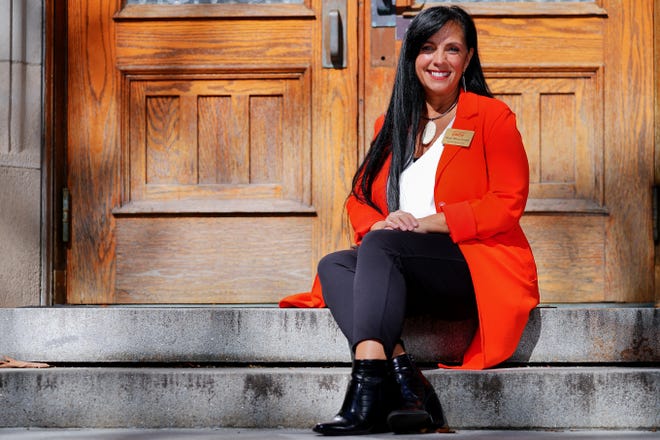

When the YWCA Hamilton hired an executive director to be the permanent replacement for Sherri Bluester, who died unexpectedly in 2016, they selected a woman that they believed would be the standard bearer for the agency's motto: "Eliminating racism. Empowering women. Promoting peace, justice, freedom & dignity for all."
Five years later, they know they selected the right person for the job.
Wendy Waters-Connell, 56, was voted in by the board in 2018 to fill the role full-time as executive director on a permanent basis following the untimely death of Bluester. Dr. Lee Sanders of Miami University had been serving as interim but did not take on the full-time role.
Other news in Hamilton: Businesses offer help after Hanover Reserve wedding venue fire
Waters-Connell has been in Hamilton for a little over 30 years and earned an undergraduate nursing degree from Miami University through a scholarship from Fort Hamilton Hospital.
She was raised in Overpeck (an unincorporated community in central St. Clair Township in Butler County) and graduated from New Miami High School.
News:YWCA unveils Cincinnati's top career women
For 18 years she served as executive director/CEO for the Quaker Heights Care Community of Waynesville.
She said it is special to lead an organization that is located in Hamilton, where she has been since getting married to her husband Christopher (a life-long Hamilton resident and HHS grad) in 1988. The couple has two sons, David and Jackson.
"Our work to end gender-based violence will continue to include domestic violence, and ending human trafficking," Waters-Connell said. "We will work to eliminate homelessness in the most vulnerable populations through permanent supportive housing."

Heritage helps
"I am a descendant of Native Americans and Europeans. Because of my hair and skin color, and my name, I was often asked as a child if I was an 'Indian,'" Waters-Connell told The Enquirer. "While not raised in the Native American culture, I am deeply immersed in learning and respecting this part of my heritage and passing it on to my children."
She added that her family has no paper trail to her father’s Native American heritage, but science led the way to trace his roots.
"We had to rely on science. DNA analysis shows that the strongest connection is to the Cree of the Saskatchewan area. I have worked hard to help my sons appreciate their heritage and be proud of this culture," Waters-Connell said. "They both sing, drum, and dance traditional Native American styles. I too am a women’s traditional dancer. Today, I speak often of this culture to help others understand descendants are living here now, and to use my experiences to build understanding and compassion."
Waters-Connell's father, Milton H. Waters, was a volunteer firefighter and EMT in Overpeck for more than 45 years, some served as chief. He was also employed as a conductor for Conrail for 30 years. He died in 2013.
Her mother, Diane, died in 2011, and one of her three siblings, Milton D. Waters, died in 2007. Waters-Connell notes her motive to help others lies in the fact that her younger brother strived to connect with the family's heritage.
The motivation to connect with those in need and to lead an organization that advocates for the rights of women and those underrepresented in society, stems from getting to know herself and the Native American roots in her bloodline, along with the blue collar upbringing that has shaped her life.
"The motive was deeply stimulated by the tragic loss of my younger brother in 2007. He was the only one in my family of origin to fully explore our heritage," she explained. "When he died, we (his surviving siblings) decided to honor our connection to him with our own journey of discovery."
Finding strength in connecting to the family's history was a source of strength for Waters-Connell.
"Our identity in this part of our heritage made us feel closer to him," she said. "Further, I owed my sons a foundation of culture to our distant ancestors. I knew it would make them stronger people if they respected their origins."
Being pushed by her parents to succeed to higher heights in life then what growing up in Overpeck might present, Waters-Connell notes that the gifts of opportunity she will never take for granted.
"I am always striving to prove that I am worthy of the gifts that were given to me which allowed me to go to college and reach a better place in life," she told The Enquirer. "I think that some may call this imposter syndrome and I would not disagree. I believe everyone deserves a chance to be their best self."
Waters-Connell says that she was told there is no such word as “can't," but the reality of limited resources was hard to understand growing up. But mentorship from other women and the support of her parents helped pave the way for her success.
"With that said, I could feel my parents wanted me to do better than they did," she said. "It took other guides to find the ways and means. I owe these female mentors everything."
Sometimes for Waters-Connell, there is a tendency to examine the reality of knowing she might not have made it this far if she was identified as Native American
"I was raised in white identity. I have the privilege of choosing how I show up in a room," she explained. "What I want you to understand is that I appreciate that a quick hair and wardrobe change and I’m white passing. I’m not red enough to be red and not fully white enough to be white but I have the opportunity to choose."
While she embraces her Native American appearance and culture as a healing opportunity, she understands her struggles are not as uphill as some of her ancestors.
"Any micro aggressions I have experienced early in life were few. This makes me even more conscientious about the suffering others have experienced because they cannot simply change their outward identity ," Waters-Connell said. I have witnessed this disparity in my own sons’ lives and it drives me to work for a world where no one is harmed by their personal characteristics or identity. It drives me toward justice. My 'privilege' should be experienced by all. None of us should rest until this is our collective truth."
COVID-19 impact successfully combatted by YWCA Hamilton
The YWCA Hamilton maintained full operations during the pandemic. Waters-Connell was able to use her medical background to help keep operations going.
How to tell the difference:COVID-19 symptoms vs. a cold, allergies or the flu
"My nursing degree was invaluable to help reduce the spread of infection in our building. We managed not to have any large outbreaks so far," she said. "Since we serve children in shelter, we remain fully masked and our vaccination rates in the building are near 90% for residents and staff. Education and appreciation of the science has helped us achieve these goals."

Community backs effort of YWCA leader and new $11 million facility
The YWCA Hamilton is constructing a new $11 million facility at 1570 Grand Blvd. according to Waters-Connell. She said the new space will provide more services for abused women and provide housing for low-income people, many of them battling addictions.
"The new facility is a result of growing demand for our programs and services, especially permanent housing for chronically homeless with disabilities and those escaping domestic violence," Waters-Connell said.
Assistant to the City Manager, Mallory D. Greenham, pointed to statistics that indicate not only is violence towards women growing, but the need to help them has increased exponentially.
"In 2020, the calls to the YWCA's crisis hotline increased by 150%, and women were showing up to the shelters with more injuries, more severe in nature, than ever before," she said. "Their shelter rooms remain vacant for only hours before another survivor (individual or family) arrives. The new facility will enable YWCA Hamilton to increase the number of safe spaces for women fleeing domestic violence and increased access for our residents to life changing support services and systems."
Ashlee Willis used to serve on the YWCA board and is active in the community. She is pleased with the agencies ongoing efforts to combat racial injustice and violence towards women.
"The YWCA Hamilton and Wendy Waters-Connell are doing some of the most important work in the county. From their domestic violence shelter to their racial justice program, their services are exactly what we need at this time," Willis said. "Under Wendy's leadership, the YWCA Hamilton has thrived and grown to be a real force for good in our community."

YWCA Hamilton has eye towards the future
The agency serves all of Butler County for permanent housing help. There are no boundaries for the domestic violence shelter, and it accepts victims from anywhere to keep them safe, but predominantly from Butler County.
"We will increase the number of individuals served on our new campus by one-third in permanent housing and we will double the number served in the domestic violence shelter," Waters-Connell said.
She explained that she will use her personal and professional journey to help promote the mission of the YWCA.
"Relationships are the core of any significant change in a society. We know that our success rests in building wider networks of people and organizations who believe in equity and empowerment," Waters-Connell explained. "YWCA Hamilton is developing a Coalition Against Hate. This group will respond to all incidences of hate in our community and connect victims of hate events to resources to heal and be represented legally."
Source link






